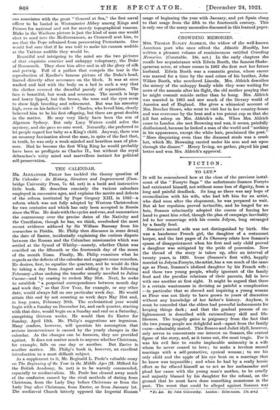LYME REGIS AND ITS HISTORY.
Tiffs pleasant little book, Lyme Regis r a Retrospect, by Mr. C. Wancklyn (Arthur Humphreys, 10s. net), though it does not profess to be more than an embellished guide- book to the watering-place made famous by the immortal Jane Austen, was well worth publishing, and in the pleasant form given it by Mr. Arthur Humphreys it may stand, without shaming them, to 11130 Pepys's words, among the other books of the library. Tho letterpress is intelligent and useful, and not without a touch of antiquarian learning. The illustrations are excellently chosen and com- petently reproduced. Charming are the pictures of Lyme, beginning with Turner's heroical representation, and there is abundance of interest in the portraits of Lymo's chief worthies. • If the magnificent head of a fighting commander is not Blake— the ascription rests on internal evidence—it ought to be. It has just that sterling magnificence and self-confidence which
one associates with the great " General at Sea," the first naval officer to be buried in Westminster Abbey among Kings and Princes for national and not for merely topographical reasons. Blake in the Wadham picture is just the kind of man one would elect to send into the Mediterranean, as Cromwell sent him, to see that the Pope refrained from persecuting Protestants. One would feel sure that if he was told to make his cannon audible at the Vatican audible they would be.
Beautiful and intriguing to the mind are the two pictures of that exquisite courtier and unhappy voluptuary, the Duke of Monmouth. They show him alive and in all the glory of silk and periwig. Full of a pathos that compels the tear is the reproduction of Kneller's famous picture of the Duke's head, limned directly after severance on the block. It was at once washed and laid with the body on a bed in such a way that the clothes covered the dreadful parody of reparation. The face is beautiful, but weak and sensuous. The mouth is large and heavy lipped, but the brows, the nose and the eyes seem to show high breeding and refinement. But was his ancestry high, even on his father's side ? Charles, who loved him, clearly believed him to be his first offspring, but there are great doubts in the matter. He may very likely have been the son of Algernon Sydney. But only Lucy Waters could solve the mystery, and she gave no sure word. Naturally, she preferred to let people regard her baby as a King's child. Anyway, there was an uncanny fascination about the man, in spite of the fact that, in truth, he was only a weak-minded and heartless man of plea- sure. Had he become the first Whig King he would probably have been as profligate as Charles II., but without the royal debauchee's witty mind and marvellous instinct for political self-preservation.



































 Previous page
Previous page